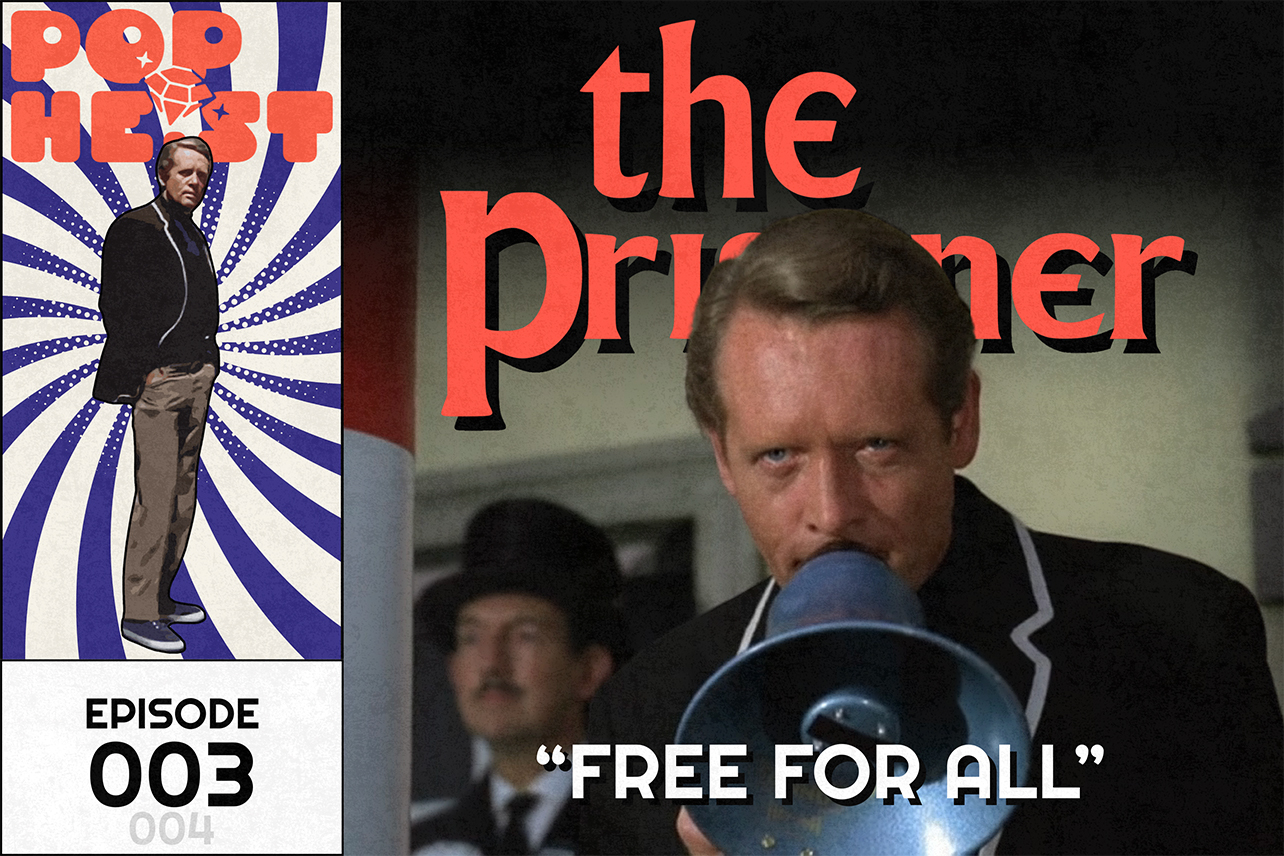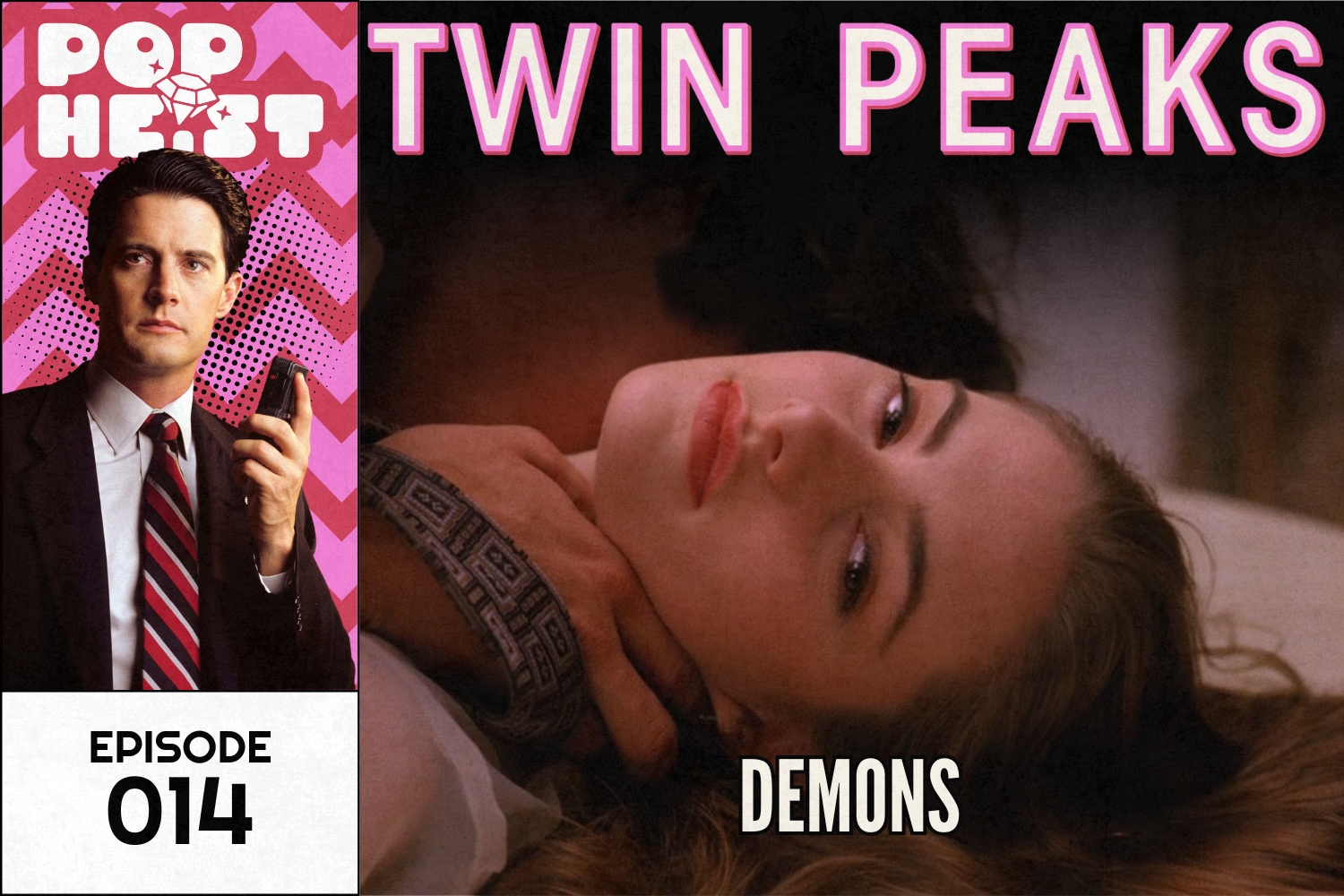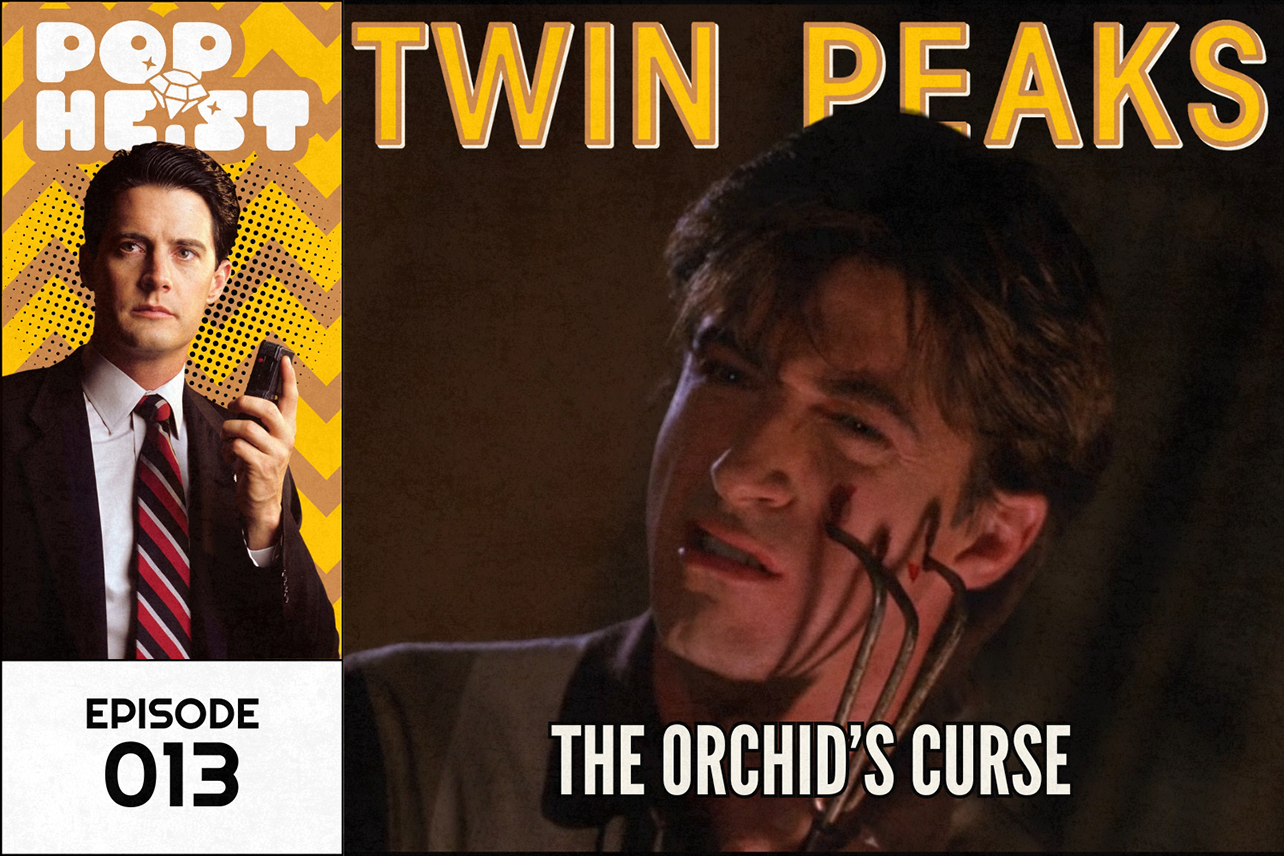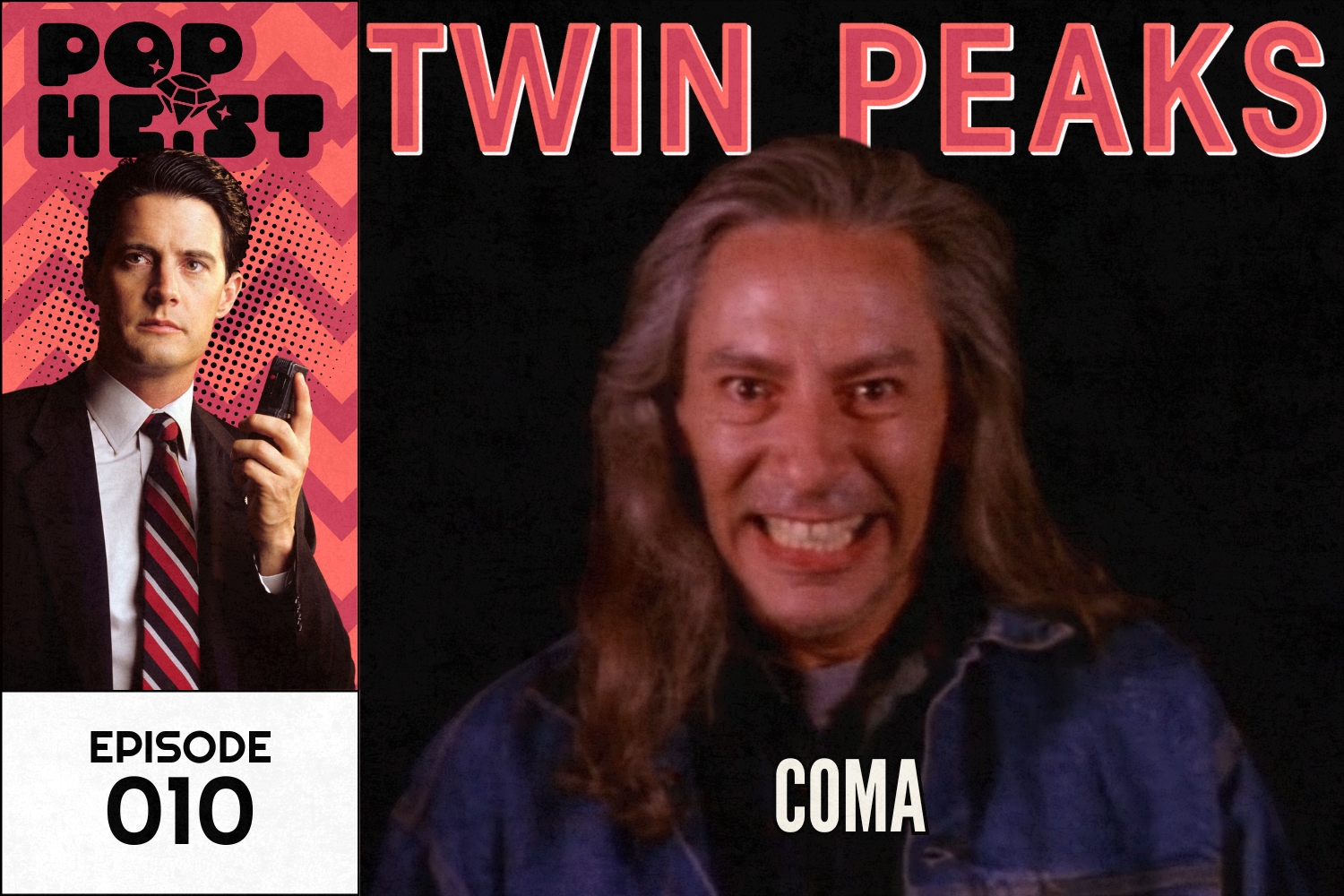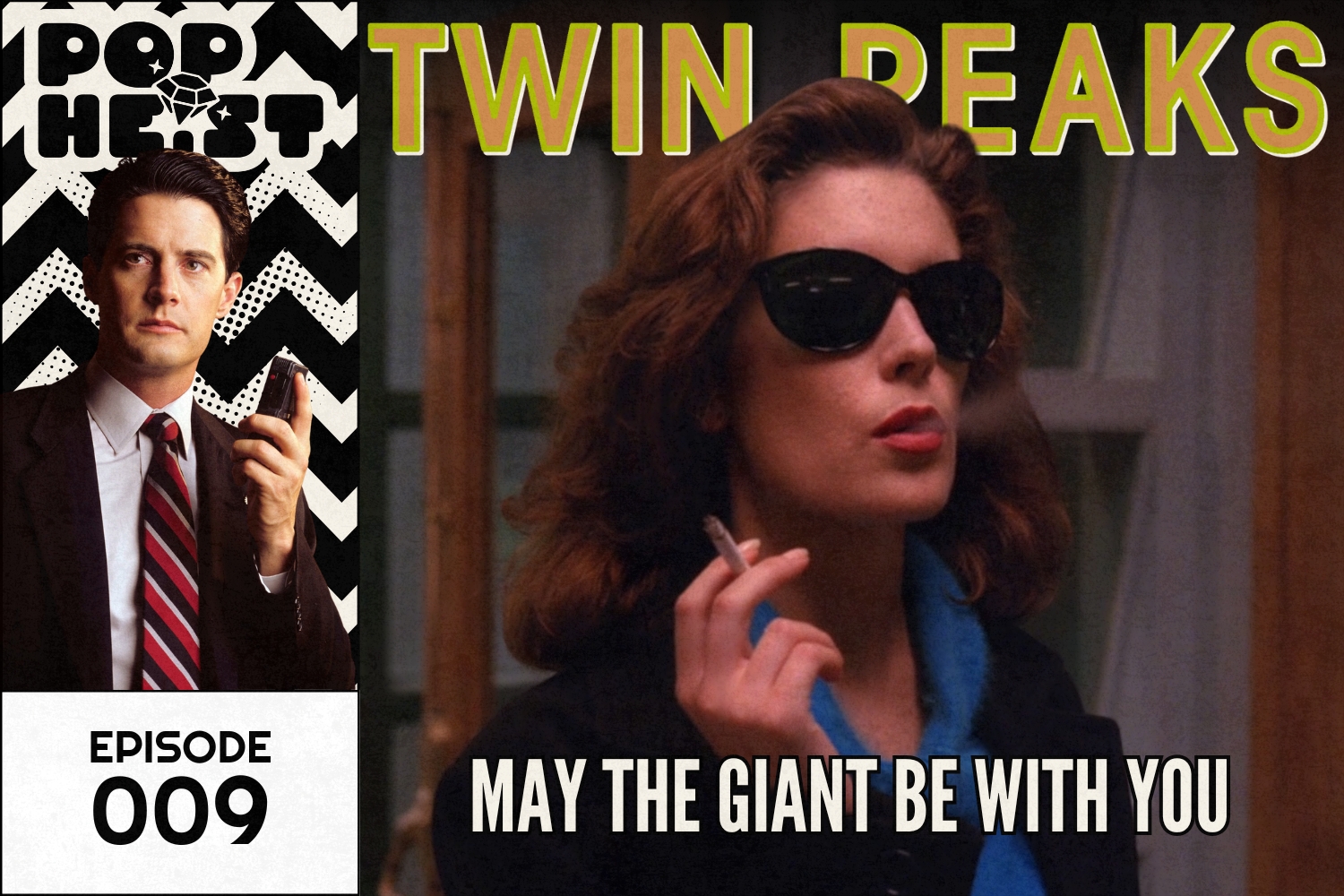In PRESTIGE PREHISTORY, Pop Heist critic Sean T. Collins takes a look at classic TV shows that paved the way for the New Golden Age of Television — challenging, self-contained stories from writers and filmmakers determined to push the medium forward by telling stories their own way.
The Prisoner Episode 4 (airdate order) / Episode 3 (AVC order)*
"Free For All"
Original Airdate: Oct. 20, 1967
Writer/Director: Patrick McGoohan (as "Paddy Fitz")
Cast: Patrick McGoohan, Eric Portman, Rachel Herbert
*NOTE: The Prisoner's proper running order is a matter of dispute; Pop Heist is using the AV Club order for the show
"Some people," says the new Number Two, "don't appreciate the value of free elections."
"Everyone votes for a dictator," Number Six replies.
Both men are, in the parlance of our times, "doing an irony" here, though each in different ways. Number Six's meaning is plain enough: Under tyranny, sham elections are held which produce preposterous landslide victories for the tyrant. It's election time at the Village, don't you know, and Number Two (Eric Portman) seems headed for just such a lopsided cruise back to the Green Dome.
This is where Number Two's sense of irony comes into play — the maddening kind, in which it sounds like he fully believes the bullshit coming out of his mouth. For one thing, we've already seen that Number Two is an appointed position, not an elected one, with new chieftains of the Village brought in at regular intervals. Presumably this is because Number One and the forces they represent don't want their little Orwellian experiment to become a leadership cult. A farcical sense of equality better suits their apparent goal of getting Number Six and any other prisoners to submit of their own volition. Regardless, the whole idea of free elections for Mayor of MK-Ultraville is absurd on its face, and as the episode's climax reveals, Number Two knows this better than anyone.
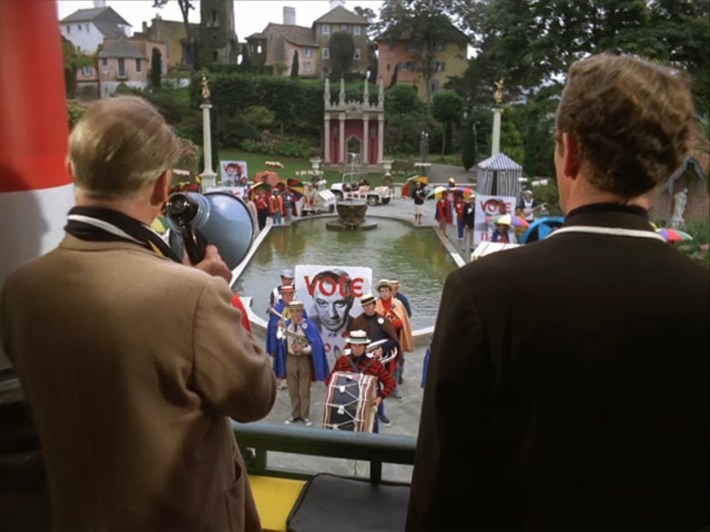
But while we viewers are frequently privy to cutaway scenes that show the various Numbers Two on their own, being cynical and duplicitous, Number Six isn't. As with so much in the Village, he can only assume he's right, and that the people in charge aren't swallowing what they're shoveling. But he has no way of knowing that. He has no way of knowing anything about the Village, except that They — whoever They are — are keeping him there to break him.
As they've shown in the past, they're not above using actual physical measures to do this. Throughout the episode, the Village thwarts Number Six's attempts to get out of the election in which he's being forced to run — oh he plans to run, alright, "the first chance I get" as he jokes right to Number Two's face — by drugging and brainwashing him.
Even just three episodes in, McGoohan — an auteur who wrote, directed, and starred in this one — seems determined to break the mold he'd only just constructed. Like an inverse Borg, the Village uses no method twice in attempting to extract INFORMATION from Number Six's mind. In this episode alone, he's subjected to plain-old propaganda, deception, physical beatings, drugged moonshine he finds being brewed in a cave by Number Two himself, psychedelic light experiments, disorienting physical movement (in the episode's most visually stunning moment, which is saying something, he's spun round and round in a red-light hellscape as he's dropped through the floor of the unelected Town Council's meeting room), and, of course, Rover the security orb, who attacks him during an escape attempt and holds him in place for his subsequent brainwashing. Multiply all this by 17 and you'll see why The Prisoner seems so much larger and more endless than its limited runtime would suggest.
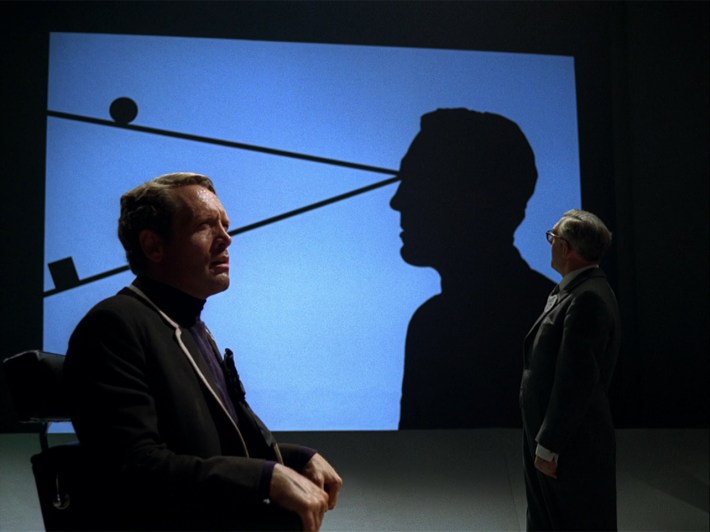
But there's something more important to Number Two's election scheme than the various science-fictional/secret-agent goings-on: Number Six's own individualistic ideals.
By this stage of his stay in the Village, Six is determined to uncover the identity of his captors, many of whom he knows are posing as prisoners and, he suspects, started out that way. So at least partially, he accepts the devil's bargain and attempts to use his run for office to expose both Number One and the "warders" hiding in plain sight. Like an expert judo player, Two is using Six's own momentum against him, luring him deeper into the Village's web while making it seem like it's his own idea.
As the short election season progresses, as Six encounters more and more "brainwashed imbeciles," he grows increasingly desperate to free not just himself, but them as well. His rage against what Charlie Chaplin labeled "machine men" in his climactic speech from The Great Dictator, which McGoohan's dialogue and delivery echoes.
"Can you laugh?" he asks the town council. "Can you cry? Can you think? Is this what they did to you? Is this how they broke you till they got what they wanted? You must still have a brain! You must desire to be a human being again!"

By the time he reaches the end of the episode, though, victory has defeated him. After trouncing Number Two in the election — Two even votes for Six himself — he's escorted into the green-domed building to take over by Number 58 (Rachel Herbert), an exuberant newcomer to the Village who's taken to the place despite her inability to speak in anything but her own incomprehensible Eastern European language. (It's actually a pastiche invented for the episode.) It takes 58 suddenly growing serious and slapping Six hard across the face repeatedly to remind him what he's there to do.
The result is painful to watch. Six frantically shuts down the Village's controls, shouting "You are free to go! Free to go! Free to go!" he shouts into a pair of his new office's L-shaped plastic phones, desperately trying to convey his winning campaign message to the people one last time.
Attempting to escape himself, he instead encounters a group of men in sunglasses contemplating an Orb and is waylaid by two security goons he battled earlier in the episode.
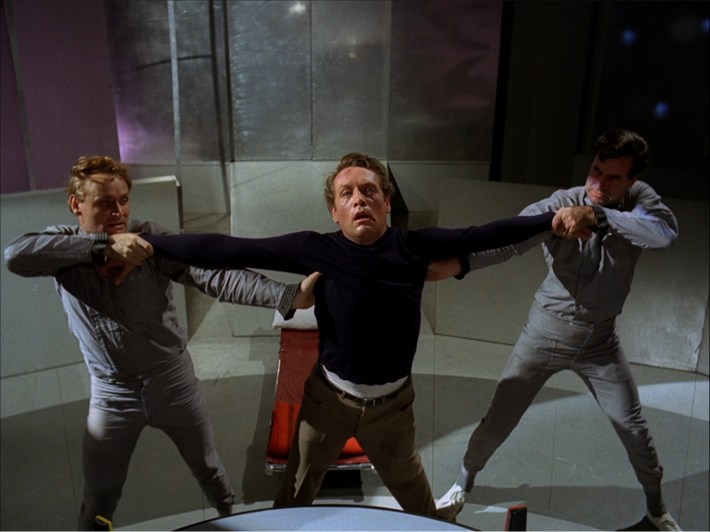
They beat him bloody in front of the real new Number Two: Number 58, who reveals she's spoken perfect English the whole time. "Give my regards to the homeland," she tells the outgoing Number Two as he takes off in the helicopter, keeping the question of whose side these people are really on an open one.
The political relevancy of "Free for All" is obvious. I mean, I didn't open with that line about not valuing free elections for nothing, you know? Beyond that, elsewhere in the episode, a reporter writes an article about Number Six for the Village newspaper, the Tally Ho, making up all his positions on the issues as he goes along; this is really no worse than trying to glean our current dictator's actual beliefs and goals from bowdlerized mainstream political reporting in the run-up to the 2024 election.
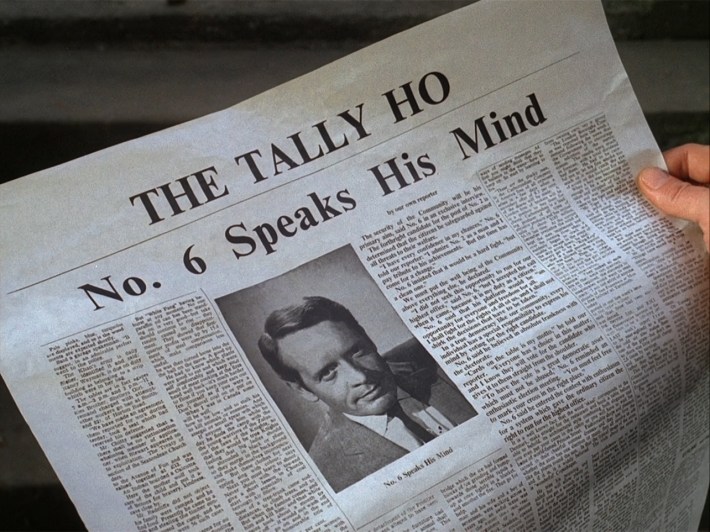
But the most unnerving thing about the episode is the way it depicts Number Six's fellow Villagers as mysterious, fundamentally unknowable people. Some of them are brainwashed automatons. Some of them are active agents of the enemy. Some seem reluctant to fulfill their duties, others positively gleeful. They spend their days in endless parades and celebrations, blasting John Philip Sousa marches and screaming at the top of their lungs — except for the times when they're eerily silent and still.
How can you possibly live in a society constructed of people this unreliable, this unstable, this incapable of conceiving of genuine common good and working towards it together? How can you live with people who've collectively abandoned reality?
This recap was originally accessible to paid subscribers only, and future recaps in this series are available now for paid subscribers. If you haven't already, consider supporting worker-owned media by subscribing to Pop Heist. We are ad-free and operating outside the algorithm, so all dollars go directly to paying the staff members and writers who make articles like this one possible.
